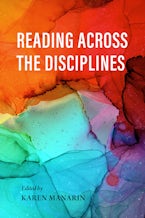- Home
- Scholarship of Teaching and Learning
- Reading across the Disciplines
Preparing your PDF for download...
There was a problem with your download, please contact the server administrator.
Reading across the Disciplines
Edited by Karen Manarin
Contributions by Joyce Tang Boyland, M. Soledad Caballero, Yvonne Davila, Heather C. Easterling, John Eliason, Nelson Graff, Rosemary Green, Neela Griffiths, Rachel Henry, Pat Hutchings, Rebecca Kersnar, Aimee Knupsky, Ryne Leuzinger, Margaret Mackey, Elizabeth Marquis, Trent W. Maurer, Brett McCollum, Layne A. Morsch, Daniel Shapiro, Catelyn Shipp, Dana Statton Thompson, Kris Vasquez, Jakob T. Zehms, Angela Zito and Jordan R. Donovan
Published by: Indiana University Press
282 Pages, 5 b&w illus., 7 b&w tables
- eBook
- 9780253058744
- Published: May 2022
$34.99
Other Retailers:
Reading Across the Disciplines offers a collection of twelve essays detailing a range of approaches to dealing with students' reading needs at the college level. Transforming reading in higher education requires more than individual faculty members working on SoTL projects in their particular fields. Teachers need to consider reading across the disciplines.
In this collection, authors from Australia and North America, teaching in a variety of disciplines, explore reading in undergraduate courses, doctoral seminars, and faculty development activities. By paying attention to the particular classroom and placing those observations in conversation with scholarly literature, they create new knowledge about reading in higher education from disciplinary and cross-disciplinary perspectives.
Reading Across the Disciplines demonstrates how existing research about reading can be applied to specific classroom contexts, offering models for faculty members whose own research interests may lie elsewhere but who believe in the importance of reading.
Foreword, by Pat Hutchings
Reading across the Disciplines: An Introduction, by Karen Manarin
Ways of Reading
1. Exploring Readerly Diversity, by Margaret Mackey
2. Understandings of Reading, by Nelson Graff, Rebecca Kersnar, Daniel Shapiro, and Ryne Leuzinger
3. "Mind the Gap", by Heather C. Easterling and John Eliason
4. Understanding how Students across the Disciplines Read Images, by Dana Statton Thompson
5. Student Reading of Documentary and Fiction Film, by Elizabeth Marquis
Reading in Specific Contexts
6. Reading-to-Write, by Rosemary Green
7. Embedding Scaffolded Reading Practices into the First-Year University Science Curriculum, by Neela Griffiths and Yvonne Davila
8. Reading and Relationships in Organic Chemistry, by Brett McCollum and Layne A. Morsch
9. Teaching Analytical Reading in Psychology at Alverno College, by Joyce Tang Boyland, Kris Vasquez, Rachel Henry, and Jordan R. Donovan
10. Strategies to Promote Reading Compliance and Student Learning in an Introductory Child Development Course, by Trent W. Maurer and Catelyn Shipp
11. Read Literature, Read the World, by Angela Zito and Jakob T. Zehms
12. Capturing Confusion, by Aimee Knupsky and M. Soledad Caballero
Index
Karen Manarin is Professor of English and Board of Governors Chair in Advanced Literacy at Mount Royal University. Lead author (with Miriam Carey, Melanie Rathburn, and Glen Ryland) of Critical Reading in Higher Education: Academic Goals and Social Engagement, she has also published in a number of teaching and learning journals.
"Reading across the Disciplines truly cuts across disciplines and approaches and shows explicitly why teaching reading should be an integral part of every course. Its exploration of the intersection of reading instruction (and its importance) and SoTL makes this a wonderful book for a general and transdisciplinary audience."
~Nicole Simmons, Brock University
"Reading across the Disciplines offers a useful set of chapters detailing a range of approaches to dealing with students' reading needs at the college level. As the Introduction points out, there is a real need for instructors across the curriculum to work on reading in every course along with a great deal of resistance to doing so. The more faculty members in all disciplines see a variety of ways to help students with reading, the more likely they are to begin to adopt some of these approaches in their classrooms regardless of their subject areas, a development urgently needed everywhere."
~Alice S. Horning, Oakland University

